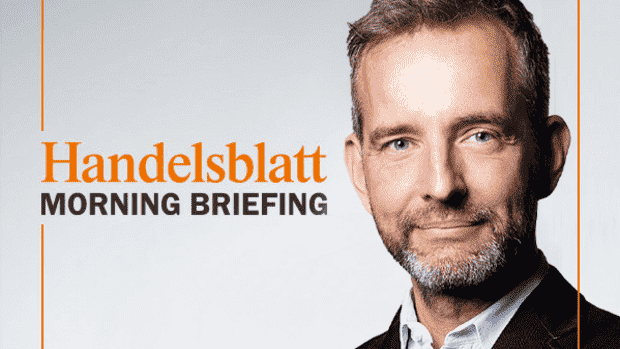Good morning dear readers,
it becomes increasingly clear: The corona pandemic marks a break in the economic era in Germany. The recession of 2020 and the sluggish recovery that we have seen since then mark the transition into an era of significantly reduced growth.
The two main reasons: the baby boomers are retiring, there are not enough young people to replace them. And the climate-friendly restructuring of the economy is driving up energy prices, which is costing citizens and businesses alike. The concise conclusion of the Handelsblatt Research Institute (HRI): “The post-corona boom we had hoped for will fail.”
The institute has lowered its economic expectations for the new year accordingly. The HRI economists are now assuming 3.4 percent economic growth in Germany for 2022, 0.3 percent less than in the forecast from September. The economy should then grow by 2.3 percent in 2023. This means that the HRI is once again at the lower end of the forecast spectrum.
Top jobs of the day
Find the best jobs now and
be notified by email.
In 2020, the HRI had already shown itself to be more skeptical than other institutes – and was right: When back then, in the autumn, growth of more than five percent was forecast for 2021, the HRI had predicted a rather restrained recovery of 2.7 percent, which was exactly what happened.
Now HRI President Bert Rürup says: “From the middle of this year, the structural problems of the German economy will come to the fore again. A return to the conditions of the golden second decade of this century is not in sight. ”In other words: economically, Germany’s best years lay between the financial crisis of 2009 and the corona crisis of 2020. We wasted them like a party beast who wins the lottery.
Would you like some examples for the thesis? The last two Merkel cabinets have overloaded social security with new benefits such as maternal or minimum pensions instead of making the system storm-proof for the foreseeable demographic change.
It is now clear that the upper limit of 40 percent of gross wages for social security contributions advocated by the federal government will fall. The economists Thiess Büttner and Martin Werding warn that there is a risk of an increase to 43.2 percent by the end of the legislative period.
Germany acted similarly sluggishly in its energy policy – and now has to make up for decarbonization within a few years, which was wasted in the golden years. This already has very concrete consequences: “We have decided to completely shut down a production line at our production site in Freital. This applies indefinitely, “said Stefan Jugel, Managing Director of Glashütte Freital, the Handelsblatt:” On the basis of current energy costs, production makes no sense. The energy costs are higher than the turnover. “
The company in Saxony, founded in 1802, has 140 employees and produces bottles and glasses on a total of two production lines. According to Jugel, the second line will be reduced to 25 percent of capacity.
Small consolation for Germany: If our decarbonization strategy à la Schopenhauer (“The world as will and imagination”) gets out of hand, we will still be able to import nuclear power from our French friends if necessary – and we will probably continue to tell about their preference for Fooling around nuclear power.
As it became known on New Year’s Day, the EU Commission wants to classify investments in nuclear power and natural gas as climate-friendly under certain conditions. Our Brussels office manager Moritz Koch analyzes a welcome act of pragmatism, even if the Greens see it differently.
(Photo: C&A)
In the back of your mind, does the abbreviation C&A also stand for “Cheap and Awful”? Then you are in good company with many consumers. When our reporter Anja Müller confronted the new boss of the notoriously secretive textile chain with the cheap and terrible cliché, Giny Boer remained calm. “Let’s prove otherwise,” replied the former Ikea manager. Your goal for C&A in five years: “We are an omnichannel provider that offers durable, sustainable clothing at an affordable price.”
Does that sound like the usual dessert from Greentalk and digitization sauce that many CEOs serve at such interviews? Well, Boer actually has a revolutionary project for the textile industry: C&A wants to revive the almost extinct textile production in Germany and in future manufacture three percent of its jeans needs in Mönchengladbach. That something like this can now pay off impressively shows: The rules of the game of globalization have changed radically in the past two years.
And then there is the New Year’s Eve party that lies behind us, which, at least in my Hamburg neighborhood, was far less quiet than the legal situation (“firecrackers ban”) would have complied with.
When I asked my neighbors where they had bought their impressive missile arsenal, the unanimous answer was: “Denmark”. This confirms the old wisdom that every new prohibition immediately creates an act of circumvention. Suggestion to politicians: If you want to curb the excesses of hyper-liberalism a little more effectively on New Year’s Eve 2022, you should think about closing all German external borders between Christmas and New Year.
Until then, I wish you a year in which the abbreviation C&A only stands for “Colorful & Amazing” – even without fireworks.
Best regards
Her
Christian Rickens
Head of Text Handelsblatt
You can subscribe to the Morning Briefing here:


